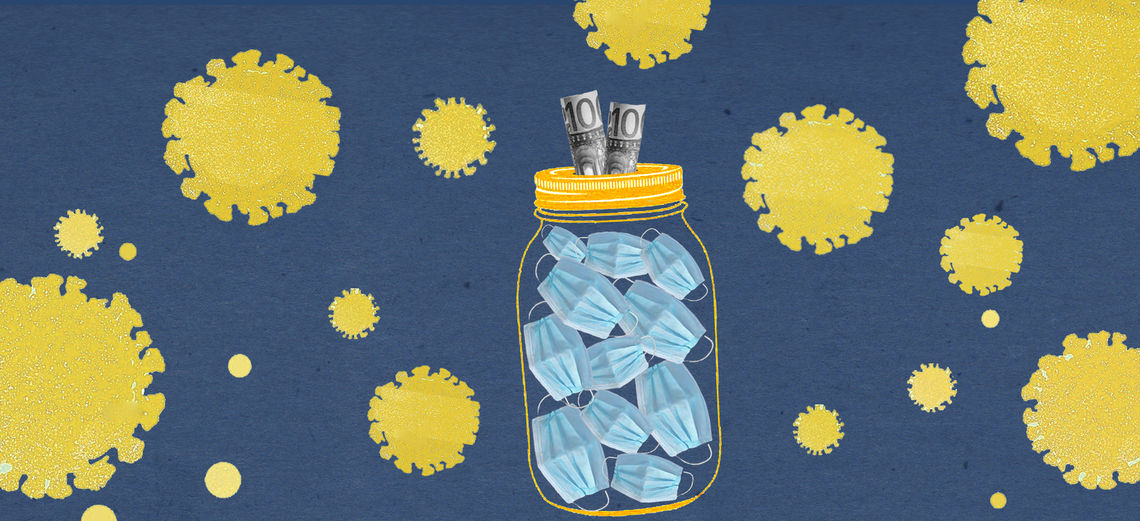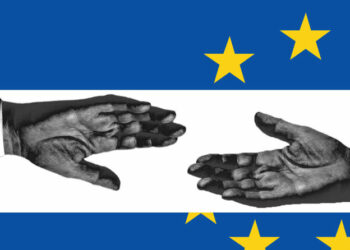
In May 2019, when the European Commission launched a consultation on the future of the Eastern Partnership (EaP), one couldn’t imagine just how urgent it would be to implement the theories envisaged in the EaP’s future concept.
In March 2020, just as COVID-19 was beginning to disrupt work patterns worldwide, the European Commission released its strategic paper concerning the EU’s Eastern neighbors entitled “Eastern partnership policy beyond 2020: Reinforcing Resilience – an Eastern Partnership that delivers for all.”
The cornerstone of the document is resilience, which is defined as “the ability of states and societies to reform, withstand and recover from domestic and international crises, on the basis of a minimum level of democracy, rule of law and sustainable development.”
“This joint communication proposes strengthening resilience as an overriding objective, with the EU, its Member States and the partner countries working together towards the following long-term policy objectives for the EaP beyond 2020,” concludes the document. Among them are achieving resilient, sustainable and integrated economies; accountable institutions, the rule of law, and security; environmental and climate change resilience; digital transformation; inclusive societies.
The struggle against COVID-19 became a testing ground for the EU and its policies towards the neighborhood. As part of the global response to the coronavirus outbreak, the European Commission prepared an emergency support package for Armenia, Azerbaijan, Belarus, Georgia, Moldova and Ukraine. It included €80 million for immediate needs and €966 million toward the short- and medium-term economic recovery of the region.
On March 27, 2020, the European Union announced a €30 million assistance package to support the health sector in EaP countries, including supplies of medical devices and personal protective equipment such as ventilators, laboratory kits, masks, goggles, gowns and safety suits, as well as training for medical and laboratory staff. The fund aims to help prevent, detect and respond to the COVID-19 pandemic in all six EaP countries.
Support for the most vulnerable groups in society amounted to about €11.3 million, including grants of up to €60,000 to civil society organizations for responding to immediate needs. It includes supporting local schools with distance learning, which is already available through the EU’s regional “Rapid Response Mechanism.” The Eastern Partnership Solidarity Programme targets the most impacted segments of the population, with sub-grants to smaller, local organizations.
All these projects are made under the Team Europe package, which was launched on April 8, 2020, to support EU partner countries in the fight against the COVID-19 pandemic and its consequences. Initially, the financial package was €20 billion, collected from EU institutions, member states and various financial institutions such as the European Investment Bank (EIB) and the European Bank for Reconstruction and Development (EBRD). The overall Team Europe package is almost €36 billion.
In his remarks to a European Parliament committee, High Representative Josep Borrell mentioned: “I am not going to mislead anyone, this is not fresh money. We do not have fresh money, unhappily. We have to restructure and to reorient our resources and our programmes in order to give priority to the fight against the pandemic and where it is most needed. It will focus on strengthening health systems and responding to the initial socio-economic crisis.”
To limit the negative impact on the economy, the EU, working closely with international financial institutions (IFIs) and financing institutions from the EU Member States, created a new €120 million support program to help small and medium enterprises (SMEs) easily access credit and boost their businesses after the crisis. The EU added over €200 million to existing credit lines and grants to SMEs in local currency through the EU4Business Initiative.
The EU made €500 million available for the EU Neighbourhood through its major de-risking instrument, the European Fund for Sustainable Development (EFSD), to rapidly provide liquidity across the region.
For each individual state, the EU allocated the following budget amounts:
- Armenia: €92 million
- Azerbaijan: €31 million
- Belarus: €60 million
- Georgia: €183 million
- Moldova: €87 million
- Ukraine: €190 million
Moreover, the EU, by readopting ongoing programs and the Public Finance Policy Reform budget support program, provided immediate support to the Armenian Government.
Furthermore, a twinning program between Armenia’s Ministry of Emergency Situations and the Swedish and Lithuanian civilian protection agencies has already been approved and, after the situation improves, will continue to enhance civil protection and disaster risk management. Twinning is one of the EU’s instruments for ensuring institutional cooperation between public administration bodies of EU member states and those of beneficiary or partner countries.
The EU worked hand in glove with other international organizations to mitigate the situation in Armenia. These programs are readjusting as the situation develops. A joint EU-UN three-year project called “Future Today: Empowering Women, Youth and Children for Deepening Democracy in Armenia” has a €3.3 million overall budget, €600,000 of which was reallocated toward the COVID-19 response. It includes various activities such as understanding the needs of vulnerable families in rural areas and providing them with psycho-social support, ensuring a safe re-opening of rural kindergartens, creating an online sales platform for small-scale souvenir and handicraft producers, and support to finalising the “Safe You” mobile App to assist women at risk of domestic violence.
Within the scope of the COVID-19 Solidarity Programme 2020-2022, civil society organizations will receive support to counteract the negative impacts of COVID-19 and contribute to the longer-term socio-economic resilience of vulnerable groups in Armenia, such as rural households, elderly people, the extremely poor, internally displaced persons, youth, women and persons with disabilities.
At the beginning of July, 10,000 COVID-19 tests were provided to Armenia, procured by the WHO with the financial support of the EU. Later that month, 28,000 medical gowns and 20,000 N95 masks for healthcare workers arrived in Armenia.
Medical teams from EU countries also tried to support their Armenian colleagues through professional exchanges.
The team, which was assembled under the EU Civil Protection Mechanism and consisted of members of the Lithuanian coronavirus crisis management team, worked in Armenia for two weeks. French doctors also showed solidarity with their Armenian counterparts. Two groups of French doctors provided support to the fight against coronavirus in Armenia.
It is clear that the EU tried to ensure comprehensive support for every layer of Armenian society – government, NGOs, the private sector, SMEs, the health system, vulnerable groups, etc. The support reached everyone from elderly people to the youth, from entrepreneurs to government agencies. It demonstrated solidarity and the spirit of a true partnership, meeting the goals of the EaP Beyond 2020 strategy.
The response to the coronavirus became a real litmus test for regional integration organizations, specifically their readiness to collectively respond to challenges and their emergency response strategies.
Armenia is a member state of the Eurasian Economic Union (EAEU). On April 3, the heads of the EAEU member states approved the proposals of the Eurasian Economic Commission on measures aimed at ensuring economic stability during the pandemic. It consisted of two packages. The first included urgent stabilization measures to maintain access to critical supplies, while the second was directed at facilitating macroeconomic recovery with the cooperation of regional financial institutions.
Before that, on March 16, the EEC Council adopted Decision No. 21 to exempt certain kinds of medical supplies (such as personal protective equipment, disinfectants, diagnostic reagents, etc.) from import duties. It later adopted a decision banning the export of cotton, wool, gauze fabric, bandages, masks, half-masks, face respirators, filters for personal respiratory protective equipment, protective glasses, disinfectants, protective overshoes, certain types of clothing and related accessories, and gloves outside of the EAEU area.
The prime ministers of Russia, Kazakhstan, Armenia, Belarus, Kyrgyzstan, as well as Moldova, which has observer status, participated in the regular meeting of the Eurasian Intergovernmental Council in Minsk on July 17, which was the first tete-a-tete summit since the start of the COVID-19 pandemic. They discussed a comprehensive healthcare action plan to prevent the spread of COVID-19 and other infectious diseases in member countries. Armenian PM Nikol Pashinyan commented: “The Eurasian cooperation would not have been so effective if it had not been underpinned by strong ties of friendship between our countries and peoples. In this context, I would like to highlight the ongoing high-level cooperation and mutual assistance that we felt these days from all our partners without exception.”
Russia provided various types of support during the pandemic to Armenia, including humanitarian assistance and vector test kits. A team of Russian doctors arrived in Armenia on July 27 and supported their Armenian counterparts in combating the virus.
Earlier in April, a team of specialists of the Russian Armed Forces arrived in Armenia to support the fight against COVID-19. The team brought a mobile laboratory to test Armenian Armed Forces personnel and those based at the Russian military base in Gyumri. During the EAEU Intergovernmental Council session, it was decided to send 20,000 coronavirus test kits to Armenia.
The COVID-19 experience demonstrated the effectiveness of Armenia’s multi-vector foreign policy. Armenia’s pandemic experience demonstrated the viability of its choice to be a member of the Eurasian Economic Union and, at the same time, to deepen relations with the EU.
also read
New Poll Reveals Widespread Approval of Government’s COVID-19 Response
The latest IRI poll shows that 71% are satisfied with how the Armenian government has handled the COVID-19 situation, but apprehension about future economic consequences remain.
Read moreObservations About Armenia’s COVID-19 Response
While it is still early to assess the effectiveness of the Armenian government’s COVID-19 response, Lusine Sargsyan reviews some of the key measures authorities introduced over the past five months.
Read moreby the same author
Visa Liberalization With the EU: Dream or Reality?
Armenian authorities have confirmed repeatedly that visa liberalization with the EU is one of the government’s top priorities, however, issues still remain.
Read moreThe Eastern Partnership Beyond 2020 – A View From Brussels
There is a growing view that the Eastern Partnership needs to formally move beyond its founding premise as a bridge between neighbors and to become a vehicle for significant economic integration and ultimately, perhaps, EU accession.
Read moreThe Eastern Partnership: From Security to Resilience
The EU’s policy toward its neighbors has had several transformations, including a shift from a “one size fits all” approach to a “pick and choose” one. Anna Barseghyan explains.
Read more





